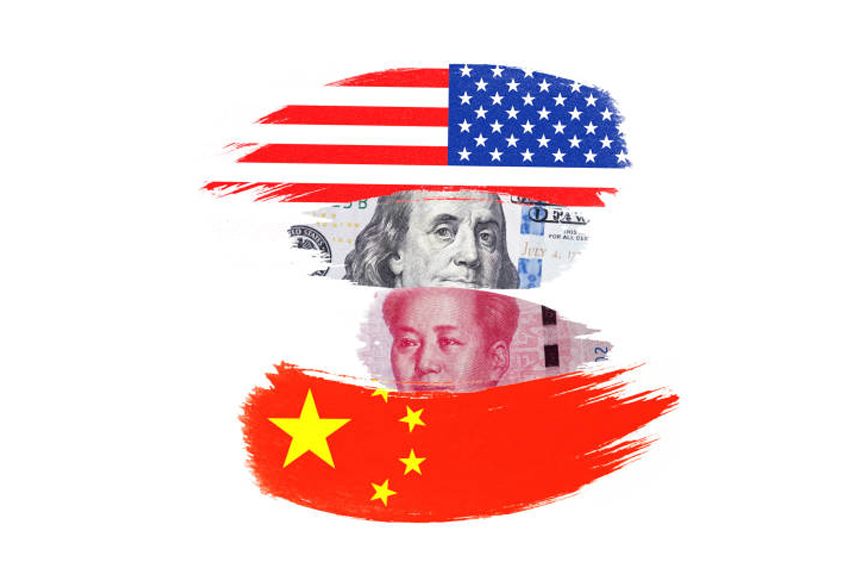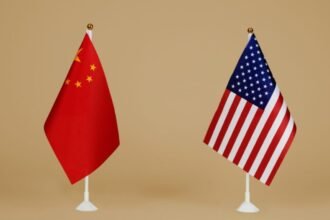The US-China trade battle between the two biggest economies in the world is expected to intensify as China’s tit-for-tat import duties on specific American commodities go into force on Monday. The action was taken in response to US President Donald Trump’s ongoing threats of imposing further tariffs on a number of nations.
Shortly after the United States imposed a 10% tax on all Chinese imports, Beijing announced the additional tariffs on February 4. A 15% border tax on US coal and liquefied natural gas products has been implemented by China in response. Furthermore, a 10% duty will now apply to American large-engine automobiles, agricultural equipment, and crude oil.
How Will the United States React?
While traveling to the Super Bowl, Trump spoke to reporters on Air Force One and reaffirmed his administration’s intention to apply a 25% tariff to all imports of steel and aluminum. On Monday, an official statement is anticipated. Although he did not identify which countries would be the target, he also alluded to possible retaliation duties on other countries.
Trump has long maintained that the European Union (EU) and other US trading partners place higher taxes on American goods than the US does on their exports. He indicated in a recent interview that taxes on EU goods would be imposed “pretty soon,” but he left open the possibility of a settlement with the UK.
What Additional Actions Has China Taken Against the United States?
Tariffs are not the only punitive action taken by China. The US tech giant Google is the subject of an anti-monopoly probe by authorities. Beijing’s “unreliable entity” list also includes PVH, the American parent firm of Tommy Hilfiger and Calvin Klein.
China has placed export restrictions on 25 rare metals, many of which are crucial parts of military hardware and electrical devices, further raising tensions. These metals are essential to a variety of industries, including electronics and aerospace, and a shortage may have serious worldwide repercussions.
Has Trump Previously Placed Similar Tariffs?
Trump has already imposed taxes on imports of steel and aluminum. He levied 25% steel and 10% aluminum tariffs during his first term, but subsequently gave duty-free quotas to some trading partners, such as Canada, Mexico, and Brazil. Before the Biden administration assumed office, the matter with the EU was still unresolved.
Trump’s most recent pronouncement raises the possibility that he won’t provide the same exemptions this time around, though it’s still unclear which nations will receive preferential treatment.
What is the reason behind China's WTO complaint?
Beijing accused Washington of making “unfounded and false allegations” about its involvement in the fentanyl trafficking to support the punitive measures the day after the new US tariffs went into force. Since then, China has complained to the World Trade Organization (WTO) about the US import levies, claiming they are “discriminatory and protectionist” and against WTO regulations.
However, experts caution that because the WTO’s dispute settlement panel is still mainly inactive, China might find it difficult to obtain a favorable verdict.
Will Trump Engage in Talks with China?
The American president has said he is not in a haste to negotiate with Chinese President Xi Jinping, despite rumors that the two leaders will do so soon. He seems more concerned with carrying out his economic ideas, which have changed a number of times since he assumed office on January 20.
What Tariff Policy Changes Have Taken Place?
Trump’s proposed policies have already undergone revisions. Along with the additional 10% tariffs that went into effect on February 4, he delayed taxes on small packages coming from China on Friday.
It will stay suspended until “adequate systems are in place to fully and expediently process and collect tariff revenue.” The US Postal Service (USPS) and other organizations rushed to comply with the decision, which originally terminated duty-free status for shipments worth under $800. For a short time, USPS stopped accepting packages from China, but a day later, it changed its mind.
There are worries about the possible effects on international markets as the US and China seem hesitant to compromise in the ongoing trade war. Numerous industries have already been impacted by the US-China trade war, and more economic upheavals may result. Analysts caution that businesses and investors throughout the world will become increasingly uneasy as the US-China trade conflict continues.








